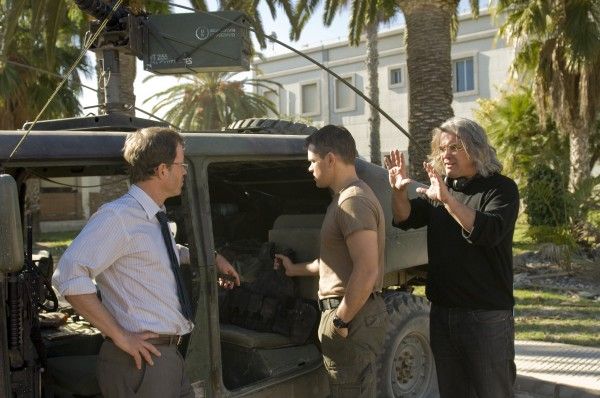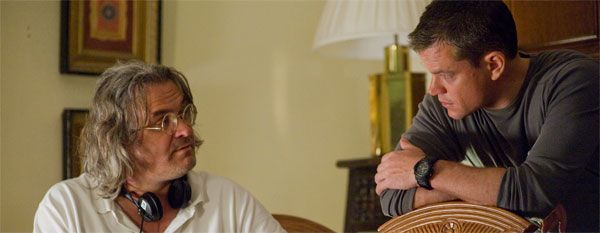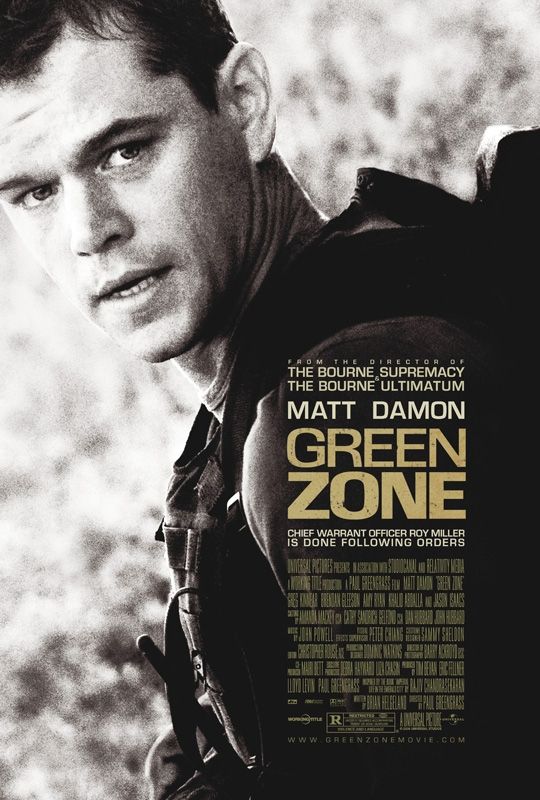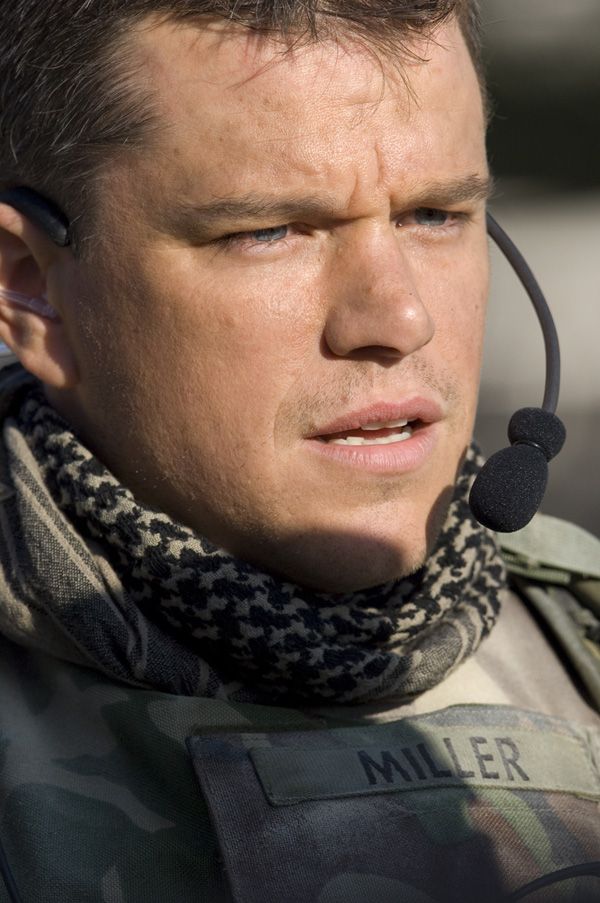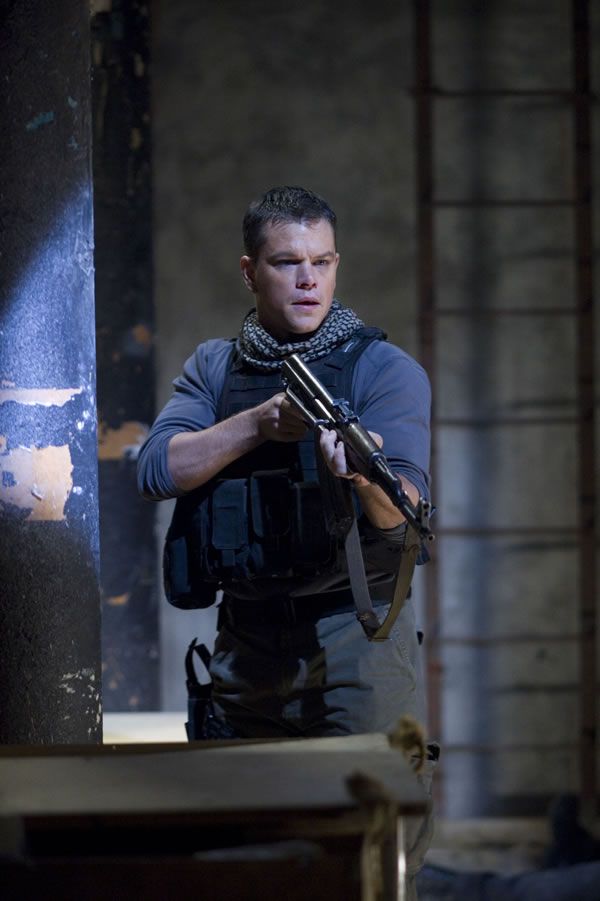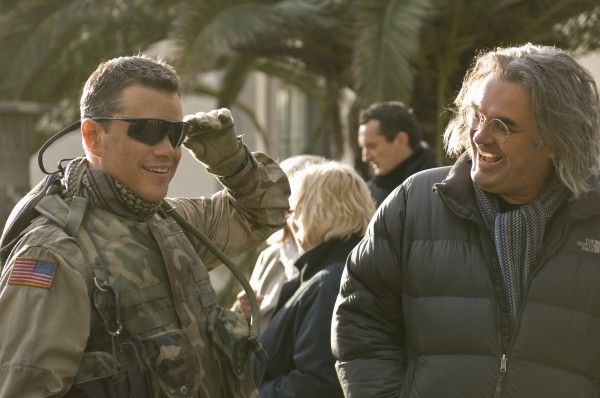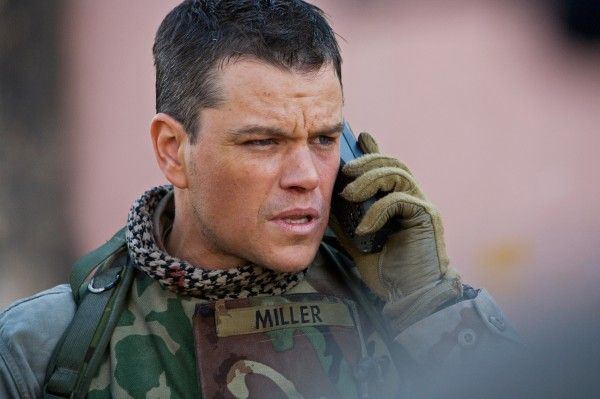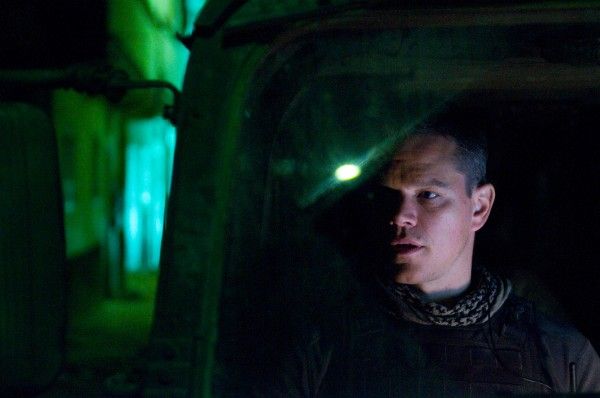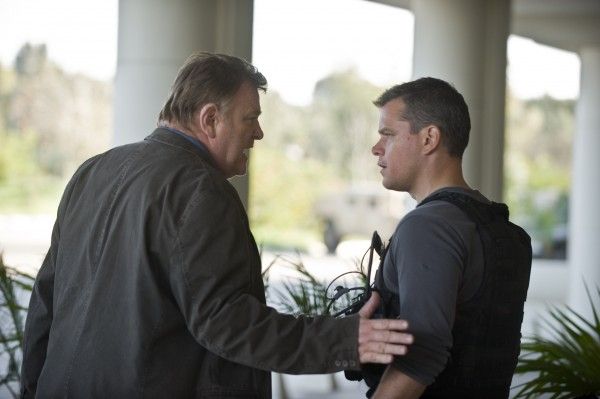Opening tomorrow is the new film from director Paul Greengrass (The Bourne Supremacy, The Bourne Ultimatum, United 93) Green Zone. Starring Matt Damon as a weapons inspector looking for WMD's in the early days of the U.S. led Iraqi War, Greengrass has taken his trademark style and applied it to a real story. Trust me, if you enjoyed the last two Bourne movies, I'm extremely confident you'll like Green Zone.
To help promote the film, I recently got to participate in a small roundtable interview with Greengrass in New York City. During our extended interview he talked to us about almost every aspect of the filmmaking process - from editing to being on set. He literally covered everything. If you're curious how Green Zone was made, it's an awesome interview. Hit the jump to check it out:
Below is the complete transcript. Click here if you'd rather listen to it (which I really recommend for this one as his answers are very long). Green Zone also stars Greg Kinnear, Brendan Gleeson, Amy Ryan, Khalid Abdalla and Jason Isaacs. And here's a link to a bunch of movie clips. Check them out to learn more about the movie.
--
I wanted to start out by talking about the editing process. You're known for improvising, for changing, having the script to go off of. How much of the film did you discover or find in the editing process? Could you talk about the post production and what went in?
PAUL: Well, you sort of can't talk about the post production unless you talk about what comes first.
True.
PAUL: I mean, listen, there's a -- all directors make films in individual ways. But the classical kind of view of filmmaking is that you have a script and it's very linear. There's a script, then you're going to shoot the script and then you cut that and then that's the end of the film. And that's never really been how I've seen it. I always try and bring screenplay, shooting and editing into a sort of symbiotic -- as close into alignment as you possibly can get them, consistent, obviously, with the resources that you've got and the time you've got available. Because it's only, seems to me that that way that you can get the what I think is the heart of the filmmaking process, which is the relationship between structure, rigidity, form, whatever you want to call it, and freedom, improvisation, the moment, whatever. And those two qualities, you have to have both. You can't have one without the other, or at least I don't think you can. Okay?
And um...I think what people sort of when people talk about my style, I think what they're talking about -- I could be wrong -- is two very different and quite extreme ends of that process married together. So I think when you think of my films, I think hopefully you think of an extreme sort of real unfolding, real-time, performed, feeling semi-improvised, you know what I mean, all that. Very real feeling, mixed with very driving and direct, clear and concise and detailed storytelling sort of things and moving with great clarity but feeling that they're unfolding as if just captured. Well, the reason that I get that, if I do, and I'm just saying, you know what I mean, when it works, which not always it does of course, is because I challenge that linear model and try and bring them into close alignment.
So what does that mean in practice? And this is a way of explaining, answering your question... it means you've got to have a screenplay going in. And most of the films that I've written, made in my life, I've written. Not all, but most I would say. But this one Brian wrote, but in any case we were a team, in effect. You're trying to create a screenplay and your screenplay is there to give you a structure, rigidity, situational awareness, who the characters are, what do they want, what's the shape of the thing, how is it going to go? Those are always the first questions asked, rather than: what's the dialogue gonna be? That's a different issue, right? Now obviously there is dialogue in the screenplay and very good dialogue at that. But you're looking to get to that solid foundation of structural confidence, so that when you go shooting, you can then open that screenplay up to your actors and make it a very biddable, free process. But from a place of where you know where you are, so you're coming into a scene knowing what you're doing. Then I like to make it very, very free and sometimes I'll make it freer even than the screenplay is so I can deny a piece of information to the actors so they really are forced to be in the moment. Sometimes if that doesn't work I might reintroduce the script so you can be any -- but essentially you're trying to free the thing up. So you've had this collision between structure and freedom. Then you get into the cutting room and Chris Rouse, who cuts all my films, will then impose an extreme degree of rigidity at that point and very, very fast, or try to, so that we can then offer that back to the filming process straight away, if resources will allow.
So let me give you a for instance for that. If you take, for instance, that long sequence that runs from Miller being at the soccer field digging and Freddy turns up and then he comes and tells Miller and Miller goes and gets the guys and they go over and they hit the house and then they go in and they get Sayyed and then they drag him back to the soccer field, put him against the wall, there's a scene, the special forces turn up, there's a scene between Miller and Briggs, there's a big fight, and then there's a fight between Miller and Briggs, then Freddy runs off in the alley and they chase him and it ends up with the scene with Freddy. That whole section which must be, I don't know, 15 minutes of screen time, Brian wrote that and pretty much we shot that and structurally it's absolutely what we shot. Yes, some of the dialogue, well, a lot of the dialogue was improvised but actually it bears a very, very close relationship to what was written.
On the way, as we were shooting, let's say, for instance, I'm going to use that as an example. We were in that location I think for about 12 days doing all those various pieces -- you know, the general's meeting, the this, that. So within that 12 days, you've got freedom to schedule as you want. You can't stay more than 12 days, but you've got that to play with. Well, I remember that our first day we were due to... we'd built in rehearsal time at the end of a shooting day 'cause it was Jason's first day, Jason Isaac's first day. So we were going to shoot -- I can't remember what it was -- we were going to shoot till 3 o' clock and then 3 to 7 we were going to rehearse so we'd be ready the next day to then shoot the helicopter arrival. Okay? That's right, and one of the reasons we had a rehearsal day was because we needed to rehearse without cameras just the whole issue of the helicopters getting in, how those guys were gonna get out and all of that and all of that. And Jason literally had just arrived, it was his first fitting, you know, etcetera, etcetera. I said to Jason, "Listen, why don't we just shoot this, 'cause we're gonna be here anyway, we're all here, it's not going costing us anything to shoot it so why don't we just shoot it? We might get something out of it. It's a rehearsal. If we don't get anything out of it, we haven't lost anything." We did that and it became very apparent during that, that...and it was Jason's idea that actually he was stopping to talk to Miller when he came off the helicopter and in fact he shouldn't. He should walk straight past the guy and just keep on going and completely ignore him, which is what we did. So we then came back the next morning and shot that, which was our shooting day. But we found it through shooting. You know. I don't think you'd have quite got that in rehearsal, quite as... 'cause there's something about the intensity of actually turning it over that makes you find it. So that's an area of the film that was very close.
There were other areas where the scene with Amy and Matt in the hotel room where we had a couple of goes at that in various different ways because we always knew there needed to be a scene between the two of them and we had various ones written, but I was never very comfortable with it. So I always tried to encourage them both to kinda perform that situation. You knew... each character knew where they were in terms of what they knew and what they were trying to get. And in the end what we ended up with was a kind of a marriage between the two, really.
So then you sort of look at another area, which I'd say would be the big end action sequence. Well, when you're shooting action, you've got to kind of... there's no point writing lots of dialogue in an action scene. You do and very great care is taken 'cause you need to be very careful about you're conveying certain pieces of information, you know what I mean? But it's a road map, that's what a screenplay is. Sometimes it's an incredibly detailed dialogue-based road map, sometimes it's a road map to the shooting of it to enable the actors to then go off and be able to seize this and run with it. Sometimes it's a first go at the road, but actually when you really get there you realize that the road shouldn't run like this, it should actually run like this and you find that through performance. Sometimes you do both and you get it all in the cutting room. You go, 'Actually if we could find that piece and that piece, the road would actually go through the middle." You know, that's... So that's filmmaking. It's a process of organically building your way to a goal that you see clearly in the distance or dimly in the distance through the terrain that you actually traverse as you go. That's what I think it is and it gives a film, for me, my films, a lift in unfolding realism because we're really solving the problems as we go along. But there is extreme rigidity going in and coming out. That's the point. Does that answer your question?
It does actually. For the purpose of authenticity, you ended up using a lot of genuine soldiers in your film. Could you talk a little about what they brought to the table and, you know, perhaps ways in which they influenced decisions that you ultimately made?
A: Well, I was always very clear that we were trying to build a thriller, a film that would have broad appeal to an audience -- essentially the audience that had come to the Bourne films. Because it's a long, well, I'm trying to get to your answer, so you understand my thought process. For me, it was impossible not to make those -- the Bourne films I'm talking about -- and not be very, very aware that there was a big audience out there who really enjoyed the particular sort of mix of elements that Matt and I put, you know, that came together for those films. In other words: a character with a strong moral agenda; a lot of high-energy, intense action that was incredibly detailed, I think, but very, very fast; strong, contemporary sort of real-world type settings; and also a good measure of kind of smartness, intelligence if you like. As you kind of get the big high-octane foot-on-the-pedal type of feel, but it's smart and urgent and contemporary and all of that. And that I think was quite a fresh mix in a familiar genre and that's often the skill, if you're working in commercial cinema where you're trying to attract a broad audience. You've got to be within genres that your audience understands, but testing them and pushing the envelope, pushing the boundaries a bit. When you get it right the audience goes, "Ah, that's new. Fantastic! I love it," but it's still sustained by the familiarity of the genre.
Okay, so when it comes -- now the other thing is, it was impossible not to be trying to stick a Bourne film very close to a kind of real world -- is what we were trying to do is make it feel like it was kind of ripped out of the headlines -- and not be aware that there's a huge kind of, you know, the world's kind of...you know, what's out there is incredibly dramatic. So clearly somewhere what we were distilling in a Bourne film by way of a sort of paranoia and a mistrust and all that stuff, the kind of conspiracy thriller if you like is what a Bourne film is, was feeling very, very fitting and exciting to that audience. Well obviously that had to have something to do, it seemed to me -- I remember sitting with you guys when we did Ultimatum -- it had to somewhere be to do with the fact that the world seemed very turbulent, and the movies sort of reflect that and they distill it and reflect it back as a kind of paranoid conspiracy thriller and the audience goes, "Yeah, that feels like of now." So you come to this film and you go: Well, let's see if we can take one step further into the real world and see if we can build a conspiracy thriller there that's got the same high energy and high octane and focused, detailed storytelling and smartness and a moral, noble hero with a moral agenda and all that stuff. Not a Bourne film, but with those same elements and instincts that we bring to the table as a partnership, and invite that audience which, after all, is the audience that's, you know, it's a young audience, say: "Does that work for you? Does that feel real? Does that feel 'Bang!', you know, that excitement of the new?" Is that a way of serving up a conspiracy action thriller, which is a classic genre if you like, but reviving it and making it feel fresh and new and interesting and original? But still maintaining it's broad appeal. So that's, that's kind of where we started from.
Okay. So once you get into the shooting of it, you're saying, "Well, this is a piece. It is those things and it is about Matt and Brendan and Amy and Khalid, and, you know, the story of the film's kind of a really great story and drive on and blah blah blah blah, but within that we can support the reality of their performances by, say, getting a lot of real guys. Because in the end, rather than cast a lot of actors to play soldiers, it's much better to get solders to act. 'Cause in the end, they know what you need and I don't have to explain to them, "Well, it's in the story. Miller has to hit this house and come narrowly face to face with the Jack of Clubs." Now you could spend a lot of time finding a lot of actors who can perform that, but in a way you're really trying to make them behave like soldiers. Well, why not just get solders? It's easier. I mean... and just say, "You've been told that's the house and let's go." And so you end up with Matt; some actors with military experience like Jerry Della Salla, who is his number two, who was sort of both in a sense; and then a bedrock of soldiers. And that just made it, I think, much, much, much better for Matt. I mean you'd have to ask him, but I think it made him just sit in the part and be very real and gave the whole thing that sort of intensity and energy. That's the thinking anyway.
Can you talk a little bit about what you saw specifically in each of the actors that you cast for their parts? What made them stand out for you?
Paul: Well, Matt, 'cause he's pretty good. [laughter]. And the world's greatest movie star. Brendan, because I wanted a guy who felt like he'd been in the Middle East a long time and seen it all, and I wanted... I was quite interested in the idea of the CIA guy being a good guy. That felt to me quite original and so we needed an actor who sort of could convey integrity, but within a sort of rough-hewn, pragmatic world view. I think he does that very well.
Khalid, because Freddy was such a very difficult character -- a guy with one leg. It'd be very easy for that character not to really feel like a real person with a real point of view that you really bought into. And he's just one of the great young British actors.
Amy, because same reason. I wanted a journalist, but I just wanted the journalist to feel very real world and caught up in her own problem. She's been given this information and now of course she's coming to check it 'cause it's not proving...you know, the stuff's not been found and when she asks the question, she gets fobbed off and then of course then she meets Miller and she has to confess to what happening. So there's a sort of, a kind of a simplicity and an, um... it wasn't a big statement. She's just very real, looked like a working reporter.
And who does that leave? Oh, Greg. Of course. 'Cause, you know, casting against type. I thought he makes an absolutely superb bad guy. And what's lovely about his performance, I think, is that you can sort of see that he's uncomfortable with it all. He really gives it a sense of misplaced idealism, which I think is that the heart of all of that stuff. Very few people do bad things because they're bad. They generally do bad things because they think they're the right thing to do, but they're misplaced. And I think you get a strong sense of that from him. A Jason, 'cause he wears the best moustache in history [laughter], and he's my old mate, so...
I'm going to ask the question that every fan out there of the Bourne franchise wants to know. Are you definitely not doing another one? Can you give people the status what's up with that.
Paul Greengrass: What happened was that I just felt, listen, I love the Bourne franchise, number one, a great deal, and I gave my all on the two films that I made. But when I was honest with myself, in the last autumn, and I was starting to get going on other things, you just can't top once you've realized you've done it. You don't have anything more to contribute to the franchise that needs to continue, obviously. And in order for a franchise to continue it needs to be rebooted and reenergized by new perspectives. I just felt that I had done it, and there's nothing unnatural about that. To make a film, it's 18 months of your life, seven days a week, 20 hours a day, you got to have real, real...and there was just too many other things I was interested in. I felt I had a wonderful, wonderful time, loved it, and I want it to continue. So, in the end, contrary to reports, there was never an argument with the studio of any kind at all. I was, I did spend some time thinking that I might, and sort of getting myself to a place, you know, "what would it be," and that was really it. It's only when you do that that you actually find, "you know what? I'm sort of gone. I'm on top of things." We had a really nice discussion, they were completely understanding, and I said, "you know what? We'll make some other movies."
So this is it. We can put a nail in the coffin, this is official, you are definitely not doing another one.
Greengrass: I'm doing some other things.
Which is the follow-up. What are you thinking about for other projects?
Greengrass: 'Dunno. Haven't gotten anything definite yet, but I'm enjoying reviving, you know, doing some...those four films...
What was it? Like eight years?
Greengrass: Yeah, I mean it's, Supremacy...actually six...Supremacy, what are we now?
2010.
Greengrass: Supremacy, 93, Ultimatum, Green Zone. I think this is also part of my sort of feeling, although I didn't realize it then, but you sort of sit down and go, "Actually, it's like the end of a chapter." They're all four films that are really about this decade and they're all sort of interlinked in a funny kind of way, even though some of them are quite different from the others. They are all really sort of about those years, and that world, and that sort of a film, the big, high-octane, action movie type of thing, so I just thought I need to find some new tricks for this old dog. Well, not so old. So you kind of go, actually, I need to do some different things, engage in some new material. I'd like to do something that's a bit more with boys and girls, and men and women. Love.
Romantic comedy.
Greengrass: You never know. A family film...you know, listen, I'll still make, I want to do...Matt and I want to do some things, continue our partnership. We'll certainly be doing that. You know, it's just time to move on. That's what happens. Listen, you be the first to say if I came back and did a bad one, you'd go, "they should have found somebody else.
What can people expect with all the extra stuff that you shoot on the Blue Ray/DVD?
There's nothing - I only shoot and take the boards off and that's the end. (laughter) They're actually very interesting. There's actually a couple of very interesting scenes that will illustrate that point you asked where you can see where we tried something, initially, to try and unfold the story. And you can see in the deleted scenes - the one particualr scenes I am thinking of - where we find something to get to the place that we that we actually got to, but we got to it from another scene. Actually I think you can see ... the key thing is you've got to have a sense of where you're aiming for. It's the difference between a map and taking the journey. The screenplay is your map the more detailed it is the more you can recon what your road actually is. The better it is, but it's not the journey itself. Brian and I - Brian fantastic he's one of my best friends and he was with this film with the exception of the strike from the first day to the day we finished the cut and we put this thing to bed. That's what I am saying writing, performing editing is something that should start with your writing and you gather all three pieces of the process - you need to keep all three pieces of the process as firmly in alignment as you possibly can and then the shooting drops away and you're left with the writing and the cutting 'till literally the last moment. Because you never stopping in the cutting room. I'd been saying to Brian what about if we did this, this and this and he'd say oh what about if we did this, this and this. That's the filmmaking process that I recognize and I think in some ways all directors recognize some version of that where it's a collaborative conversation. And rather like a piece of music, instruments come in and instruments fall away and one of the skills of being a director is to say we'll look we don't' need the trumpets, but I need to sit with the brass and get that bit or the strings or whatever and get that bit but you're moving forward to the end.

